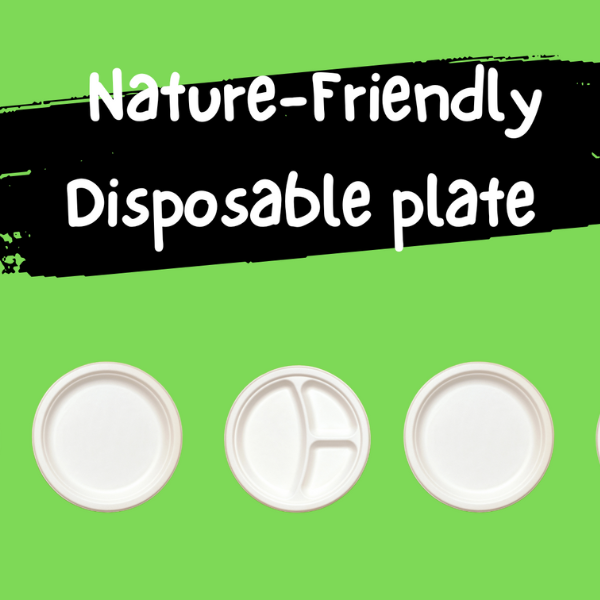
As the environmental impact of single-use plastic grows, businesses are seeking eco-friendly alternatives. The need for sustainable tableware is more urgent than ever.
Eco-friendly disposable plates are a simple yet impactful choice to reduce waste. These plates are biodegradable, compostable, and often made from renewable resources.
It’s time to explore nature-friendly disposable plates. In this article, I will break down what they are, the different types available, their benefits, and how businesses can make the switch to more sustainable products.
What Are Nature-Friendly Disposable Plates?
Nature-friendly disposable plates offer a green alternative to traditional plastic and paper plates. Unlike their plastic counterparts, these plates are typically made from renewable resources such as bamboo, sugarcane, or palm leaves. They are biodegradable, compostable, and are free from harmful chemicals, making them a sustainable choice for consumers and businesses alike.
Nature-friendly plates are not only eco-friendly but also durable and reliable. These plates can handle hot and cold food, and they break down naturally without harming the environment.
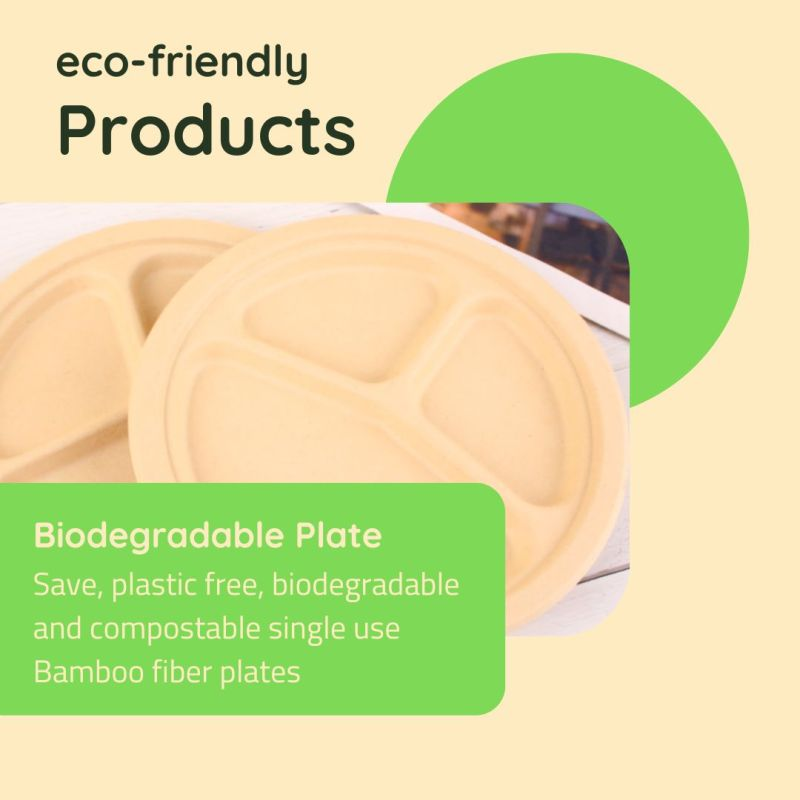
Comparison with Traditional Plastic and Paper Plates
Traditional plastic and paper plates have long been a staple in the disposable tableware industry. However, they are problematic for the environment. Plastic plates take hundreds of years to decompose, while paper plates are often coated with wax or plastic, which makes them non-compostable.
Nature-friendly disposable plates, in contrast, are made from materials that break down quickly, usually within a few months. This reduces waste in landfills and helps lower the overall environmental impact.
| Feature | Plastic Plates | Paper Plates | Nature-Friendly Plates |
|---|---|---|---|
| Material | Petroleum-based | Wood pulp, often coated | Bamboo, sugarcane, palm leaves |
| Decomposition Time | Hundreds of years | Weeks to months (if uncoated) | Months |
| Biodegradable | No | Sometimes (if uncoated) | Yes |
| Compostable | No | Sometimes | Yes |
| Environmental Impact | High | Medium | Low |
Types of Nature-Friendly Disposable Plates
There are several types of nature-friendly disposable plates available today, each with its unique benefits. The most common types include bamboo plates, palm leaf plates, sugarcane (bagasse) plates, plant fiber plates, and compostable paper plates.
Bamboo Plates
Bamboo plates are made from fast-growing bamboo, a renewable resource that is strong, durable, and biodegradable.
Bamboo plates are ideal for events, picnics, and food services. They are sturdy enough to hold both hot and cold food, making them a versatile option.
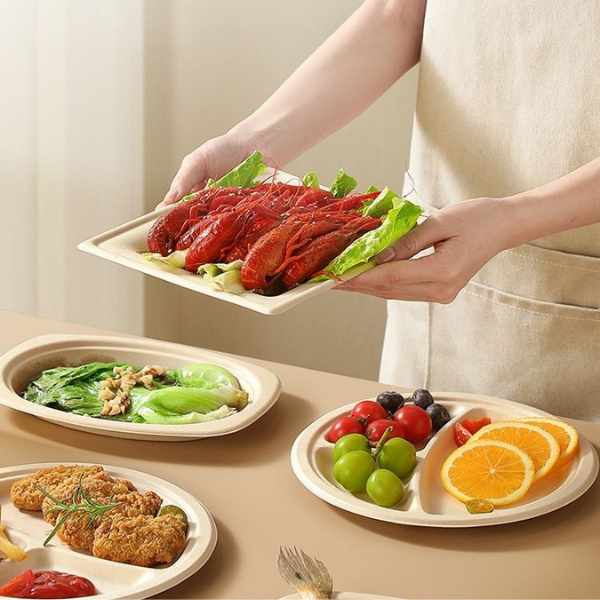
Benefits of Bamboo Plates
- Renewable Resource: Bamboo grows rapidly and requires little water or maintenance.
- Biodegradable: Bamboo plates break down naturally without harming the environment.
- Durable: Despite their light weight, bamboo plates are strong and resistant to leakage.
Ideal Uses for Bamboo Plates
- Events: Bamboo plates are perfect for weddings, parties, and other large gatherings.
- Food Service: Restaurants and catering services can use bamboo plates to align with sustainability goals.
- Picnics: Bamboo plates are a great option for outdoor dining.
Palm Leaf Plates
Made from naturally fallen palm leaves, palm leaf plates are 100% compostable and add an aesthetic appeal to any event.
Palm leaf plates are highly durable and can handle both hot and cold food. Their natural look and texture make them an attractive option for upscale events.
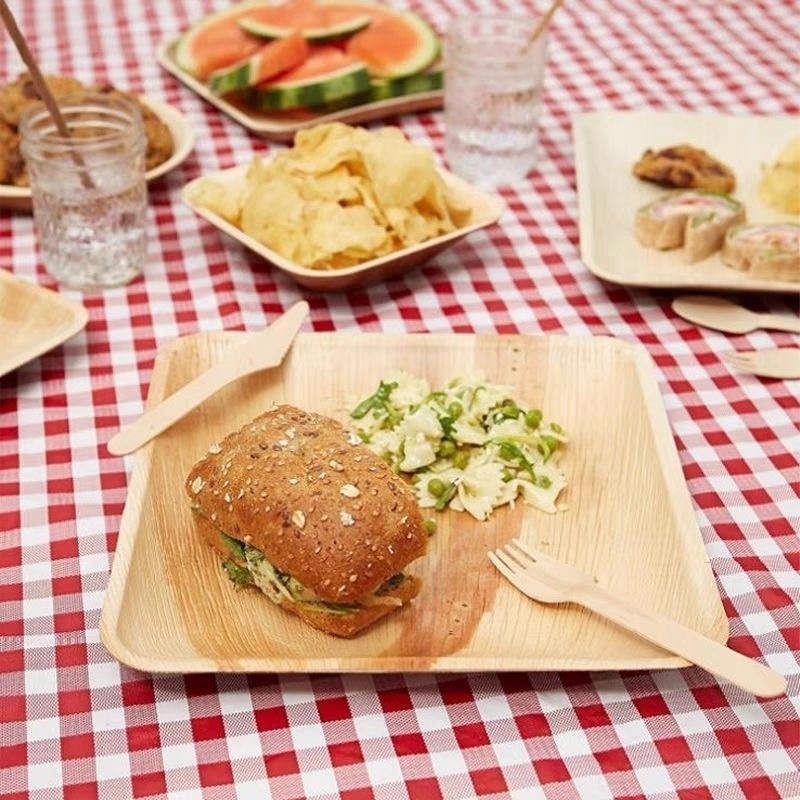
Benefits of Palm Leaf Plates
- Compostable: These plates decompose quickly, making them an eco-friendly choice.
- Aesthetic Appeal: The natural texture of palm leaves gives these plates a rustic and elegant appearance.
- Sturdy: Palm leaf plates are strong and capable of holding heavy foods.
Ideal Uses for Palm Leaf Plates
- Weddings and Special Events: Palm leaf plates add an elegant touch to upscale events.
- Restaurants: Ideal for serving meals in eco-conscious dining establishments.
- Picnics: Perfect for outdoor gatherings where style meets sustainability.
Sugarcane (Bagasse) Plates
Sugarcane plates are made from the leftover fibers of sugarcane after juice extraction. These plates are biodegradable and provide a sustainable way to use agricultural waste.
Sugarcane plates are an excellent choice for food types that need a reliable, sturdy base.
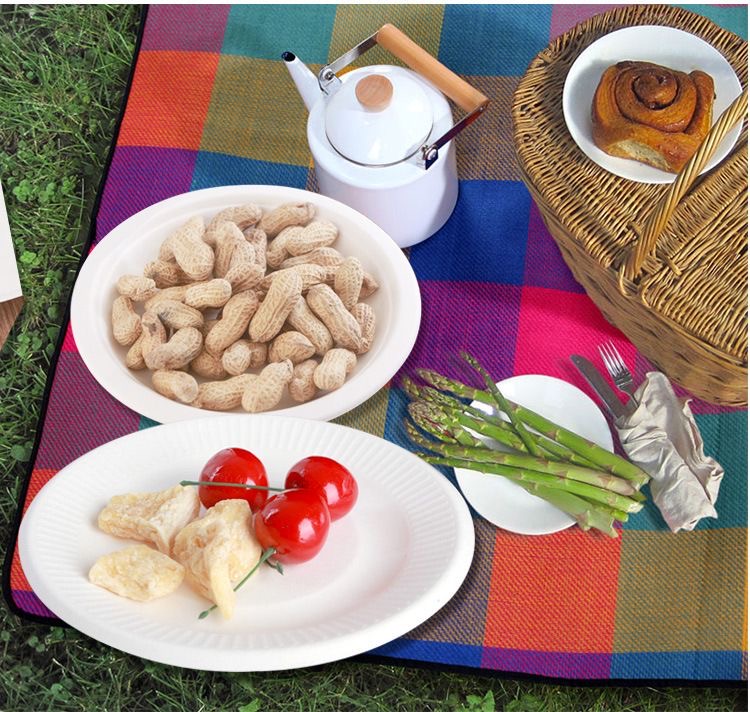
Benefits of Sugarcane Plates
-
Biodegradable: Bagasse plates break down naturally, making them an eco-friendly option.
-
Eco-Friendly Resource Utilization: Made from bagasse, a sugarcane byproduct, these plates help reduce waste and optimize resources.
-
Versatile: Sugarcane plates work well for various types of food, including greasy or saucy dishes.
Ideal Uses for Sugarcane Plates
- Food Service: Restaurants and caterers use these plates for fast service, especially for greasy foods.
- Festivals and Food Events: Great for food stalls or takeaway dishes at outdoor events.
Plant Fiber Plates
Plant fiber plates are made from various plant fibers, such as wheat straw or rice husks. These plates are fully compostable and offer an excellent alternative to plastic.
Plant fiber plates are strong and leak-resistant, making them an ideal choice for hot, greasy, or wet foods.
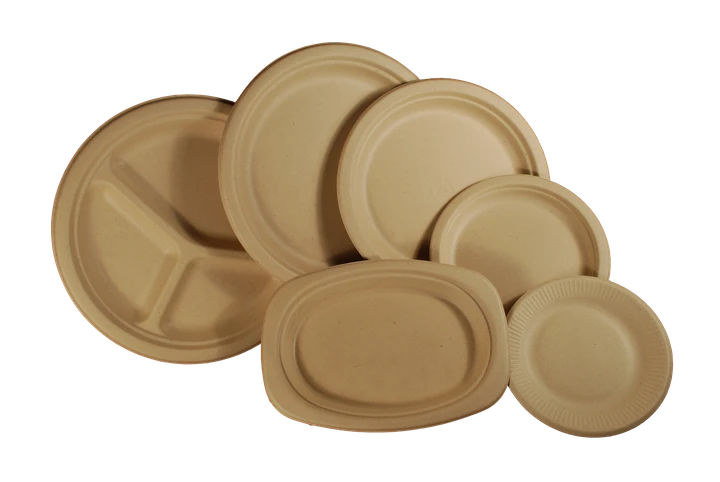
Benefits of Plant Fiber Plates
- Compostable: Made from natural fibers, these plates are 100% compostable.
- Leak-resistant: These plates can handle a variety of foods without becoming soggy or leaking.
- Durable: Despite their lightweight composition, plant fiber plates are strong enough for most foods.
Ideal Uses for Plant Fiber Plates
- Restaurants: Perfect for serving hot or greasy foods without leakage.
- Catering: An excellent choice for large-scale catering, offering a sustainable option for disposable tableware.
Compostable Paper Plates
Compostable paper plates are made from uncoated, unbleached paper. They are compostable and break down quickly in the environment.
Compostable paper plates are a great option for businesses seeking a budget-friendly, eco-friendly disposable plate.
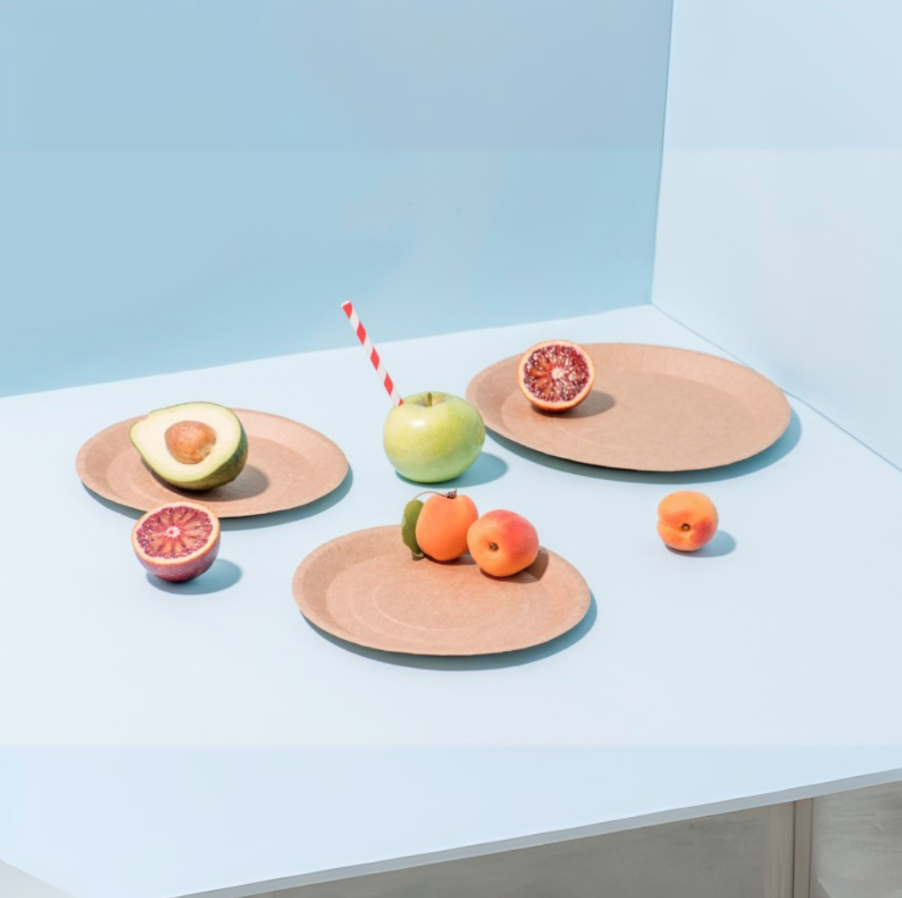
Benefits of Compostable Paper Plates
- Compostable: These plates break down in compost, reducing waste.
- Affordable: Paper plates are often more cost-effective than other eco-friendly options.
- Non-toxic: Made without harmful coatings or chemicals.
Ideal Uses for Compostable Paper Plates
- Events: Perfect for casual events, outdoor gatherings, and community picnics.
- Schools and Institutions: Schools and cafeterias often use these plates for their low cost and eco-friendliness.
Benefits of Using Nature-Friendly Disposable Plates
Switching to nature-friendly disposable plates offers numerous benefits. They contribute to sustainability, promote a healthier environment, and meet the growing consumer demand for eco-friendly products.
Environmental Impact
Nature-friendly plates play a crucial role in reducing plastic waste. Unlike plastic, which can take hundreds of years to decompose, eco-friendly plates break down within months, lowering pollution levels and reducing landfill waste.
By using nature-friendly plates, businesses can reduce their environmental footprint and contribute to a cleaner, greener planet.
Health Benefits
Many traditional plastic plates are made with harmful chemicals, which can leach into food. Nature-friendly plates are chemical-free, providing a safer alternative for consumers.
Bamboo, for example, has naturally antimicrobial properties, making bamboo plates a safer and healthier choice for food service.
Durability and Performance
Eco-friendly plates are often more durable than plastic or paper plates. They can hold hot, wet, or greasy foods without compromising their structural integrity. Many nature-friendly plates are also microwave- and oven-safe, adding convenience for consumers.
The durability and performance of these plates make them an excellent choice for both businesses and consumers looking for reliable disposable tableware.
Choosing the Right Nature-Friendly Disposable Plates
When selecting nature-friendly disposable plates for your business, it’s vital to consider various factors that ensure sustainability and practicality. Your choice can enhance your brand’s environmental credentials while meeting customer needs across different markets. Here are key considerations tailored for various customer groups:
1. B2B Clients (Wholesalers, Distributors, and Retailers)
For wholesalers and distributors, aligning products with local sustainability regulations is crucial:
-
Product Certification: Ensure plates have certifications like compostability and biodegradability (e.g., FSC, BPI) to comply with regulations in regions like Europe and North America, where laws are tightening on disposable products.
-
Price and Quality Balance: Clients often seek a balance between quality and cost. Sugarcane (bagasse) plates are a cost-effective biodegradable option but may lack durability compared to bamboo plates, which are sturdier but pricier.
-
Supply Chain and Logistics: Reliable suppliers are essential for timely deliveries, especially for bulk orders. Delays can disrupt supply chains and affect customer satisfaction.
-
Product Variety: Offering a range of options such as bamboo, palm leaf, and sugarcane plates allows clients to select products that best fit their needs for different settings like restaurants or events.
2. Food Service Providers and Catering Businesses
For food service businesses, disposable plate choices directly impact brand image:
-
Durability and Performance: Plates must withstand hot or moist foods without compromising integrity. Bamboo plates excel in this area due to their durability and leak resistance.
-
Food Safety and Hygiene: Ensure compliance with food safety standards. Bamboo plates have natural antimicrobial properties, making them suitable for food service providers concerned about hygiene.
-
Aesthetic Appeal: Choose plates that enhance food presentation. Palm leaf plates offer a rustic charm ideal for upscale dining experiences.
3. Supermarkets and Retailers
Sustainability is increasingly demanded by consumers in retail settings:
-
Packaging and Branding: Retailers appreciate branding opportunities with eco-friendly products. Customizing bamboo plates with logos can attract environmentally-conscious consumers.
-
Consumer Education: Provide clear disposal guidelines to educate customers on composting processes or highlight certifications on packaging to build trust.
-
Sustainability Appeal: In North America and Europe, detailed sustainability reports are often required by retailers. Plates made from compostable materials like bamboo or sugarcane align well with these expectations.
4. Event Organizers and Large Venues
Event organizers are increasingly seeking sustainable options:
-
Capacity and Customization: Large events often require significant quantities of disposable plates. Bamboo plates are durable and versatile enough for various foods, making them suitable for events.
-
Environmental Responsibility: Vendors who align with sustainability goals attract eco-conscious clients. Offering renewable resource plates helps reduce environmental impact.
-
Design and Aesthetic: Customizing plates with event branding can create a memorable experience. Palm leaf plates are particularly popular for weddings and upscale events due to their natural look.
5. Online Retailers and E-commerce Platforms
In the competitive online marketplace, standing out is essential:
-
Product Sourcing and Supplier Reliability: Partner with trusted suppliers to ensure consistent quality. While bamboo plates may be more expensive, their durability justifies the cost.
-
Customer Reviews and Feedback: In e-commerce, positive consumer feedback is crucial. Focus on sourcing high-performance plates to encourage favorable reviews.
-
Marketing and Certifications: Highlight product certifications in listings using relevant keywords like “compostable” or “eco-friendly” to improve visibility in search results.
Frequently Asked Questions
-
Are biodegradable plates safe? Yes, biodegradable plates are generally safe, as they break down naturally without releasing toxic substances.
-
Do compostable plates break down in landfills? Compostable plates break down best in composting environments. In landfills, they may decompose more slowly due to lack of oxygen.
-
How long do compostable plates take to break down? Compostable plates typically break down within 90-180 days in proper composting conditions.
Conclusion
Selecting the right nature-friendly disposable plates involves understanding customer needs while balancing quality with environmental responsibility. Each target group—whether B2B clients, food service providers, retailers, event organizers, or online sellers—has unique considerations that must be addressed.
By choosing plates that meet these diverse requirements regarding durability, aesthetic appeal, or environmental impact, businesses can contribute positively to the global shift towards sustainability while enhancing their market presence.

Shmily Lee
Hi there! I’m Shmily, a proud mom to an amazing boy and the manager of PANABAM. We’ve been producing eco-friendly bamboo tableware that’s both sustainable and high-quality. I’m passionate about helping businesses embrace greener solutions. Let’s connect and create a more sustainable future together!